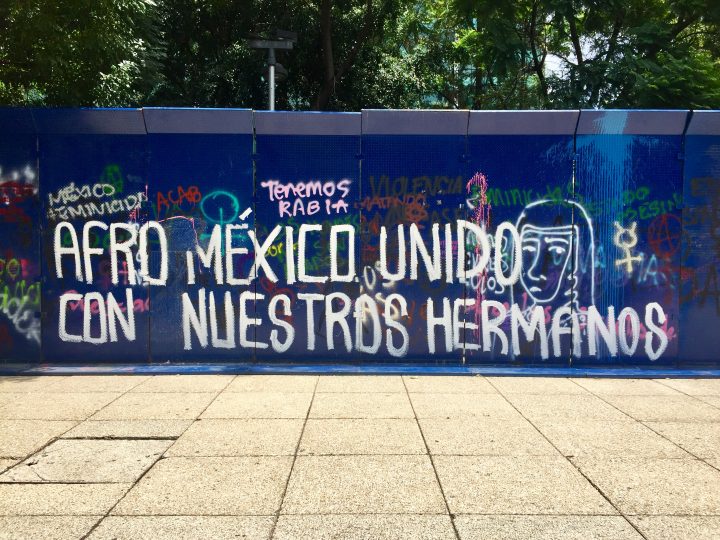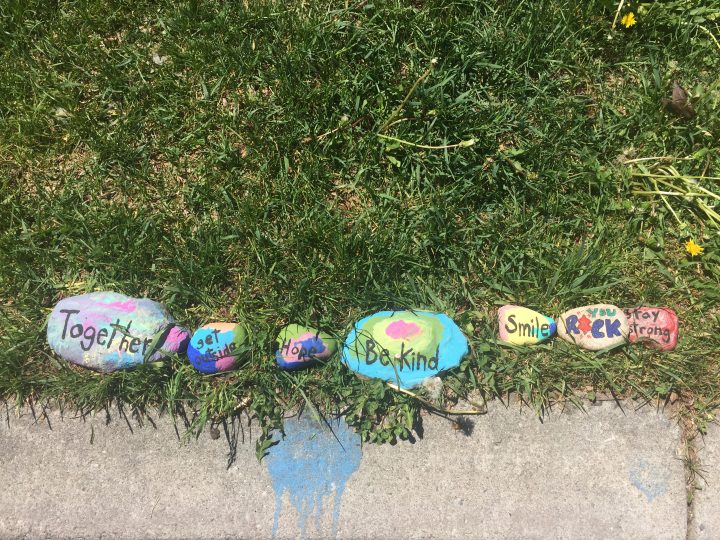
Ephemeral graffiti in solidarity with George Floyd and Black Lives Matter, outside the US Embassy in Mexico City just seconds before being erased. Photo © Rodrigo Fernández de Gortari
I really wanted to finish this editorial letter today, but that was also the case yesterday, and three days before, and four (six? eight?) before that, when my oldest brother tested positive for COVID-19. He’s ok, as is the youngest of my brothers, the asymptomatic one.
Only today, though, I rocked along with millions of people living in Mexico to the rhythm of a 7.1 earthquake. My partner didn’t have time to grab his shoes but he handed me my favourite facemask, which I managed to put on as we ran down the stairs.
Excuse me for hogging the limelight. If I choose to write in the first person, it’s because that’s the best tool I could find to express not my own anxiety but the fact that by now, the feeling the editorial board shared when planning this issue has morphed into a different state. The overpowering reminders that control is but a fragile, senseless illusion are sinking in.
Moreover, whatever devices do exist to keep us “safe” in the midst of the current pandemic are distributed as unequally as everything else in this ever more soul-less configuration of the globe.
“You know how they keep saying, ‘We’re all in this together?’” writes Montréal-based nurse Scott Weinstein in his sensitive letter from the frontline in Washington. “We’re not. In this city that is now majority white thanks to relentless gentrification, our expanding COVID ICU beds are filled with blacks and Latinos, many of them in medically-induced comas on ventilators.” As he pauses to imagine what the situation must feel like to his coworkers, to patients and their loved ones, one can only hope that enough people read his declarations before it’s too late. “This is a very cruel disease exacerbated by our efficiency-driven health care,” he comments about the fact that families are not allowed to visit except if their loved one is about to die. “We don’t have much to offer in the way of cures, yet we certainly are inflicting pain on families through our medical isolation protocols to prevent the spread of the virus.”
There is the disease, and it’s scary enough, but even scarier are the underlying policies, and those that are improvised as we go.
On that note, inevitably Mr. Trump managed to make it into the issue. Social psychologist Mark Silverman describes the president of the United States’ behaviour as a “schizophrenogenic strategy to derange the mental health of a large sector of the population in order to nurture a trove of true believers…”—a population that we can only hope will keep shrinking and keep failing to fill arenas, as was the case in Tulsa last June 20, despicably close to Juneteenth.
The issue includes a short story by Ami Sands Brodoff, written before the pandemic, which centres on the mourning process of a teenaged character, and a lucid, bold and angry piece by Queens-based writer Andrés Castro, addressing the narrator’s online therapist.
Naghmeh Sharifi, the artist featured in this issue, shares a series of works that she “unpainted” (out of a solid base coat of blue) as part of the Phi Centre’s Parallel Lines virtual residency. A house plant, a moment of self-grooming, a selfie of her shadow in her bedroom become monochromatic, conceptual self portraits.
A number of narratives in the first person, written under the effect of the pandemic, include Catherine Watson’s “Diary of the Great Confinement,” Marie Thérèse Blanc’s “Carpe Noctem (Woman v. Virus, 2020),” and Louise Carson’s “Plague Days: Poetics in the Time of COVID-19,” which starts off as a poetry review and morphs into a much more personal piece. Readers will be able to discern the exposed emotions in the form of hesitations, confessions and witty descriptions. Or intriguing, intimate humour, as is the case with Mark Foss’s “Call and Response.” Or probing insights, like those of Michael Bristol, who, after mulling over different life-altering experiences and masterfully reflecting on human nature, sadness and beauty through the characters in Shakespeare’s Richard II, writes that “Grief compels us to understand what really matters, over against the irresistible power of contingency in our lives.”
For the hundreds of thousands of people who have decided to protest on the streets since the execution of George Floyd, what really matters is to dismantle the system of police brutality and racism, rather than try to stay “safe.”
When we began planning this issue, we wondered what sorts of societies the aftermath of the pandemic would expose. While atrocities like the callous murder of George Floyd are part of an all too predictable pattern of racial violence, I don’t think any of us could have foreseen such widespread, global expressions of outrage and signs of promising changes: the vandalized statue of slave trader Edward Colston sinking into the river in Bristol; Senegalese citizens kneeling on the beach in solidarity; Angela Davis, as brilliant as ever, reminding us that “After many moments of dramatic awareness and possibilities of change, the kinds of reforms instituted in the aftermath have prevented the radical potential from being realized.”
So far, for sure.











